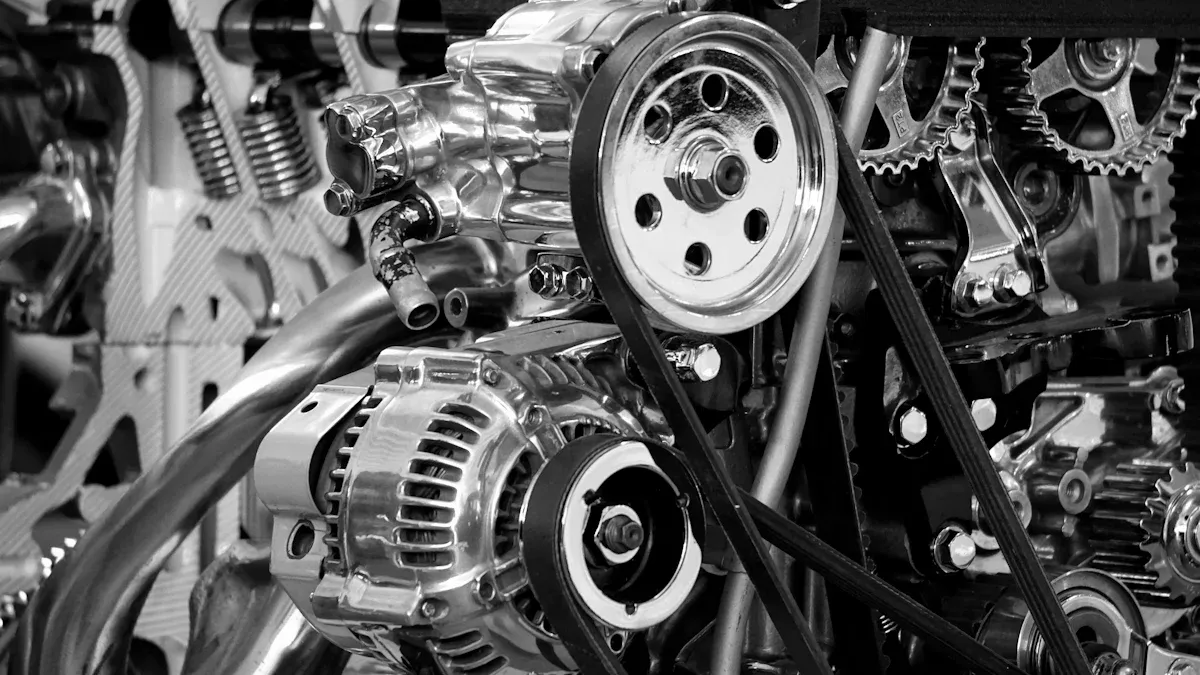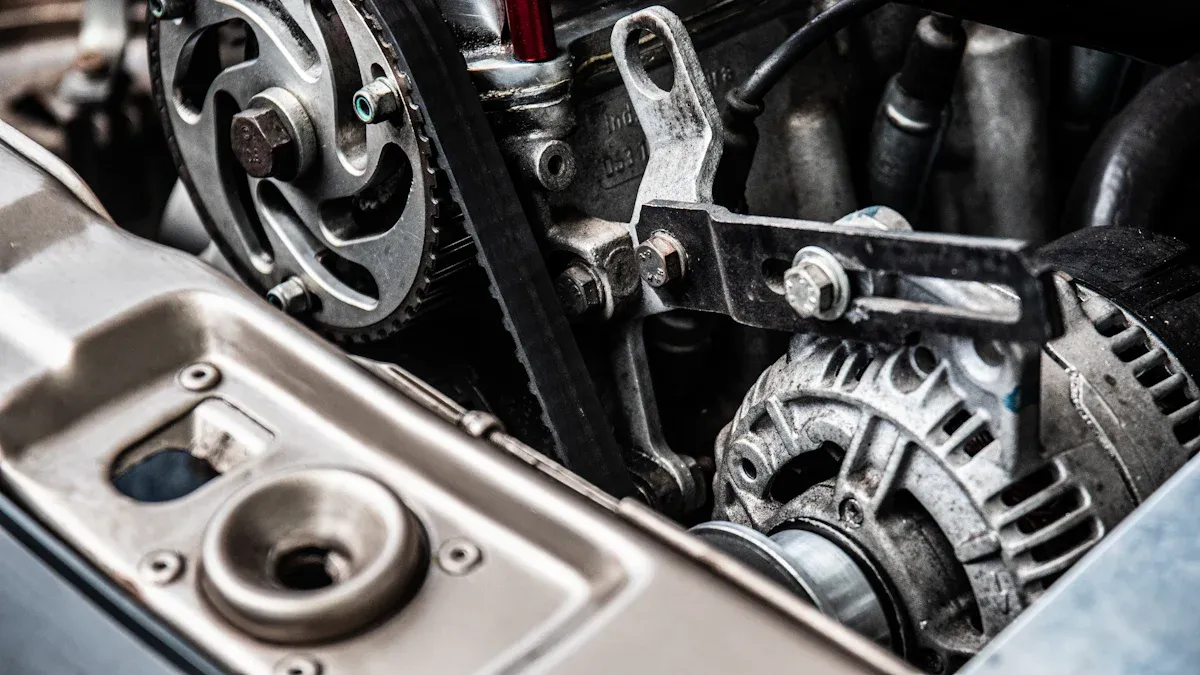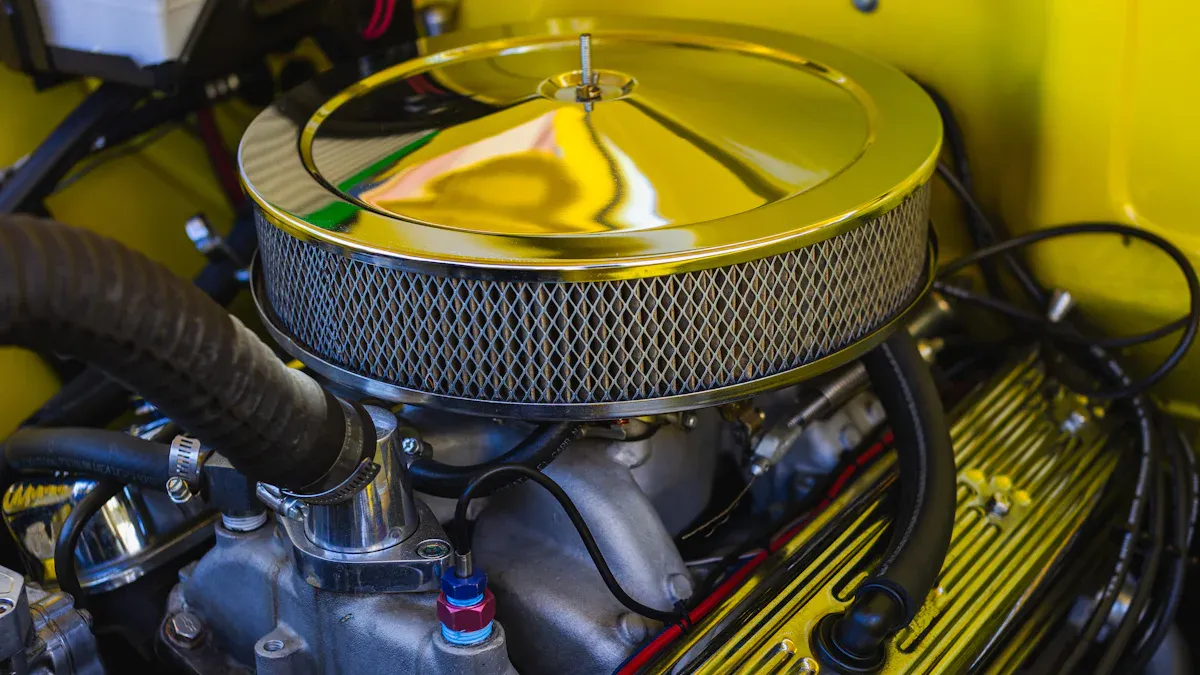
Choosing the right injection molding manufacturer is essential for producing reliable automotive parts. A single defective component can jeopardize vehicle safety and disrupt supply chains. Manufacturers with expertise in custom injection molding and robust quality assurance processes play a vital role in avoiding such risks. The global injection molded automotive parts market, valued at $89.62 billion in 2023, is set to grow to $129.25 billion by 2032, driven by the demand for lightweight vehicles. Reducing vehicle weight by 10% can improve fuel economy by up to 8%, making high-quality parts indispensable for innovation.

Understanding the purpose of your automotive part is the first step in custom injection molding. Each part serves a unique role, whether it’s a structural component, an interior feature, or a functional element like a gasket. Automotive parts often require specific material properties and intricate designs to meet these roles. For example, a dashboard panel must balance aesthetics with durability, while a sealing gasket demands flexibility and resistance to extreme temperatures. Injection molding is the primary method for producing such parts, as it accommodates the complexity and precision required in automotive applications. Clearly defining the intended application ensures the design and manufacturing processes align with your goals.
Material selection plays a critical role in the success of custom injection molded parts. The automotive industry increasingly relies on advanced materials like thermoplastic elastomers (TPE), polyurethane (PU), and composites for their durability and performance. For example, ABS and polypropylene are popular choices due to their strength and ability to withstand harsh conditions. These materials resist breaking, endure temperature fluctuations, and contribute to the longevity of automotive components. By selecting the right material, you can ensure your parts meet industry benchmarks for durability and safety. This step also supports sustainability by enabling the use of lightweight, high-performance materials.
The complexity of your part’s design directly impacts the cost and quality of the injection molding process. Automakers often prioritize lightweight materials and intricate designs to improve vehicle efficiency and meet emissions standards. However, achieving these goals requires precise engineering and advanced manufacturing techniques. Design of Experiments (DOE) helps injection molders optimize process parameters, ensuring performance and production efficiency. For example, stress distribution and processing capacity must be carefully evaluated to avoid defects. By addressing design complexity early, you can reduce costs and enhance the quality of your custom injection molded parts.
When choosing a custom injection molding manufacturer, their experience in the automotive industry should be a top priority. Manufacturers with extensive experience understand the unique challenges of producing automotive parts. These parts often face harsh environments, including exposure to extreme temperatures and chemicals. They also require tight tolerances, sometimes as precise as +/- .001 inches. Only a manufacturer with a proven track record can consistently meet these demanding requirements.
Experienced manufacturers also excel in material selection. With over 25,000 engineered plastic materials available, choosing the right one is critical. Each material offers specific characteristics, such as strength, flexibility, or resistance to wear. A trustworthy manufacturer will guide you in selecting materials that meet your performance and durability needs.
Case studies can further highlight a manufacturer’s expertise. For example, Wiegel helped a tier automotive supplier redesign parts for an EV battery and engine prototype. Their suggestions reduced costs while maintaining quality. Similarly, Elimold has produced high-precision molds for major automotive OEMs like Ford and GM, showcasing their ability to handle complex projects.
A manufacturer’s portfolio provides valuable insights into their capabilities. Look for examples of past projects that align with your needs. Metrics such as collaboration with OEMs, use of advanced equipment, and adherence to budgets demonstrate their ability to deliver high-quality results. For instance, manufacturers using advanced injection molding machines, such as 300-ton or 3000-ton presses, can handle a wide range of production volumes.
Strong supplier relationships also reflect a manufacturer’s reputation. These partnerships often lead to better problem-solving and innovative solutions during the manufacturing process. Reviewing a portfolio allows you to assess whether the manufacturer has the expertise to meet your specifications.
Certifications are a clear indicator of a manufacturer’s commitment to quality and compliance. Look for certifications like IATF 16949, which ensures continuous improvement in automotive manufacturing processes. ISO 9001 guarantees that the manufacturer maintains high-quality standards across all production sites. Additionally, ISO 14001 demonstrates a focus on environmental management, while TISAX® highlights data security in the automotive industry.
These certifications not only validate the manufacturer’s credibility but also ensure that their processes align with industry requirements. A manufacturer with relevant certifications is more likely to deliver reliable and high-quality custom injection molded parts.
By evaluating a manufacturer’s experience, portfolio, and certifications, you can make an informed decision. This approach ensures that your automotive molding company meets your expectations for quality, precision, and reliability.

When selecting a plastic car parts manufacturer, you must confirm their ability to handle your required production volume. Automotive parts often demand large-scale production, and the manufacturer’s capacity to meet these needs is critical. Plastic injection molding offers scalability, allowing costs to decrease as production increases. For example, manufacturers can efficiently produce dashboards, engine components, and other parts with precise dimensions and high strength.
To evaluate production capacity, consider metrics like efficiency, scalability, and precision. Injection molding ensures consistent quality even for complex designs, making it ideal for high-volume manufacturing. Reviewing the manufacturer’s past projects and production data can help you determine if they can meet your volume requirements without compromising quality.
| Evidence Type | Description |
|---|---|
| Efficiency | Injection molding improves the efficiency of automotive parts production. |
| Scalability | The injection mold manufacturing process is highly scalable, with costs decreasing as production increases. |
| Precision | Injection molding offers precision for producing complex components with high efficiency. |
The machinery and technology a manufacturer uses directly impact the quality and efficiency of your custom injection molding project. Advanced machinery, such as high-precision injection molding equipment, ensures dimensional accuracy within 0.01 to 0.001 mm. This level of precision is essential for automotive parts, where tight tolerances and intricate designs are common.
Modern equipment also reduces material waste and energy consumption. For instance, optimized molds and energy-efficient machines can cut material waste by 20–40% and lower energy costs by up to 50%. These savings not only reduce costs but also support sustainable manufacturing practices. When evaluating a manufacturer, ask about their machinery’s capabilities and how they maintain consistent quality across production runs.
Reliable material sourcing is vital for uninterrupted production. The automotive industry’s focus on lightweight and fuel-efficient vehicles drives demand for advanced materials like thermoplastics and composites. These materials enhance performance and durability while reducing vehicle weight.
Supply chain disruptions, such as material shortages, highlight the importance of working with a manufacturer that prioritizes material availability. Companies like Team 1 Plastics regularly reassess their supply chains to adapt to challenges. This proactive approach ensures they can meet production demands without delays. When choosing a plastic injection molding service, inquire about their material sourcing strategies and how they handle supply chain issues.
| Key Insight | Description |
|---|---|
| Demand Drivers | The automotive industry drives significant demand for injection molding materials due to a focus on lightweight and fuel-efficient vehicles. |
| Material Importance | Lightweight materials are essential for enhancing battery efficiency in electric vehicles, impacting the choice of injection molding materials. |
| Future Trends | As the automotive sector evolves, reliance on advanced injection molding materials is expected to increase. |
By assessing production capacity, technology, and material sourcing, you can ensure your manufacturer has the expertise and resources to meet your needs. This evaluation guarantees high-quality parts and reliable production timelines.
Quality assurance is the backbone of reliable plastic injection molding service. You need a manufacturer that follows structured quality control processes to ensure flawless production. These processes typically include four essential stages:
By prioritizing these benchmarks, you can ensure your parts meet stringent quality standards and perform reliably in automotive applications.
Tip: Ask your manufacturer about their quality assurance processes and how they address potential defects during production.
Certifications validate a manufacturer’s commitment to quality and continuous improvement. ISO 9001 and IATF 16949 are particularly important for automotive injection molding.
Manufacturers like Matrix Tool, certified to ISO 9001:2015 and IATF 16949:2016, demonstrate their ability to meet strict quality standards. Adhering to these certifications reduces waste, improves efficiency, and ensures consistent quality across production processes.
Note: Manufacturers working with OEMs and Tier 1 suppliers often require IATF 16949 certification to validate their quality management systems.
Timely deliveries and clear communication are critical for maintaining smooth operations in automotive manufacturing. You should evaluate a manufacturer’s performance indicators to ensure they meet your expectations.
| KPI | Description |
|---|---|
| On-Time Delivery | Measures the percentage of orders delivered on time. |
| Internal Reject Rates | Tracks the rate of defects found during internal inspections. |
| Customer Delivered Part Quality | Assesses the quality of parts delivered to customers. |
Effective communication also plays a key role in project success. Manufacturers should align with your project requirements and timelines, document discussions and design changes, and maintain comprehensive records for future reference. These practices ensure transparency and minimize misunderstandings during production.
Tip: Request detailed reports on delivery performance and quality metrics to assess a manufacturer’s reliability.
By focusing on quality assurance, certifications, and delivery performance, you can select a plastic car parts manufacturer that meets your needs for quality and on-time deliveries.
Prototyping and mold flow analysis are essential for ensuring the success of your plastic injection molding service. These processes help identify potential issues before production begins, saving time and resources. For example, mold flow analysis predicts where defects like weld lines or air traps might occur. This allows you to make corrections early, reducing the need for costly rework.
Prototyping also provides a tangible model of your part, enabling you to test its functionality and design. By evaluating factors such as material performance and cooling efficiency, you can optimize the mold design. This approach minimizes warping and inaccuracies, ensuring high-quality parts.
Tip: Collaborate with a manufacturer that offers these services to streamline production and enhance product reliability.
Strong design and engineering support can significantly improve the performance of your automotive parts. A skilled team can optimize your product design for manufacturability, ensuring it meets functional requirements while minimizing costs. For instance, simplifying the design reduces the number of components, which lowers the risk of dimensional incompatibility.
Engaging a plastics partner early in the design phase can save time and reduce iterations. They can test different materials, add durability in critical areas, and modify designs as needed. This proactive approach ensures your parts meet industry standards and perform reliably in real-world conditions.
Note: A plastic car parts manufacturer with diverse expertise can provide the stability needed for long-term partnerships, even during industry fluctuations.
Post-production services add value by simplifying your supply chain and reducing lead times. Services like assembly, packaging, and quality inspections ensure your parts are ready for immediate use. For example, a manufacturer that offers assembly can combine multiple components into a finished product, saving you time and labor costs.
Packaging services also play a crucial role in protecting parts during transit. Custom packaging solutions prevent damage and ensure your products reach their destination in perfect condition. By choosing a manufacturer with comprehensive post-production capabilities, you can focus on other aspects of your business while ensuring consistent quality.
Callout: Strong partnerships with your injection molder enhance project outcomes and ensure seamless production from start to finish.
Choosing the right manufacturer for automotive parts involves more than just comparing prices. You should evaluate their quality standards, expertise, and additional services to ensure they align with your goals. Visiting facilities, requesting quotes, and reading online reviews can provide valuable insights into their capabilities.
Building a long-term partnership with a reliable manufacturer offers significant benefits. These include cost reductions through loyalty discounts, priority treatment for your projects, and improved collaboration for better product development. Injection molding also supports intricate designs and cost-effective production, making it ideal for automotive applications.
Tip: Use market data, such as revenue trends and competitor analysis, to assess a manufacturer’s future potential. This approach ensures you select a partner who can adapt to industry changes and support your growth.
| Benefit Type | Description |
|---|---|
| Cost Reduction | Long-term partnerships often lead to cheaper costs due to loyalty discounts from manufacturers. |
| Priority Treatment | Loyal customers are prioritized, ensuring their projects receive more focus and attention. |
| Enhanced Collaboration | Working closely with manufacturers fosters a partnership that can lead to better product development. |
By focusing on these factors, you can establish a partnership that ensures high-quality parts, timely deliveries, and long-term success.
Lead times vary depending on the complexity of your design and production volume. On average, it takes 4–12 weeks to complete a project. Prototyping and mold creation often require the most time. Ask your manufacturer for a detailed timeline to plan effectively.
Collaborate with your manufacturer during the design phase. Use tools like mold flow analysis to identify potential issues. Simplify complex designs and choose materials that suit your part’s functionality. Early feedback ensures your design is optimized for production.
Tip: Share 3D CAD files with your manufacturer for precise evaluations.
Yes, injection molding is ideal for high-volume production. It offers scalability and consistent quality. Manufacturers can produce thousands or even millions of parts efficiently. Ensure your chosen manufacturer has the capacity and technology to meet your volume needs.
Thermoplastics like ABS, polypropylene, and TPE are common for automotive parts. These materials offer durability, flexibility, and resistance to extreme conditions. Your material choice depends on your part’s application, such as structural strength or heat resistance.
Evaluate their experience, certifications, and portfolio. Check if they offer value-added services like prototyping and post-production support. Visit their facility and review testimonials to ensure they meet your quality and delivery expectations.
Note: Look for certifications like ISO 9001 and IATF 16949 to ensure high standards.